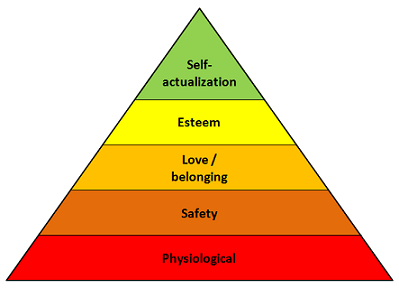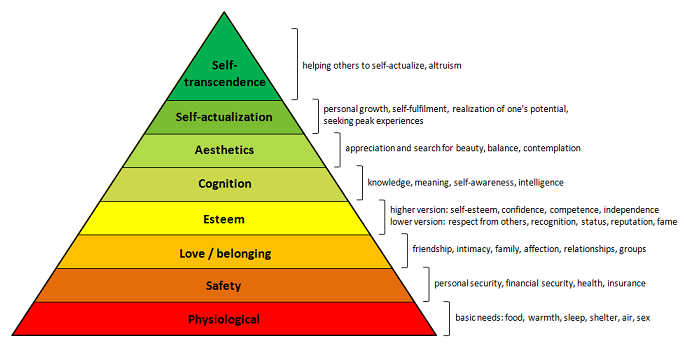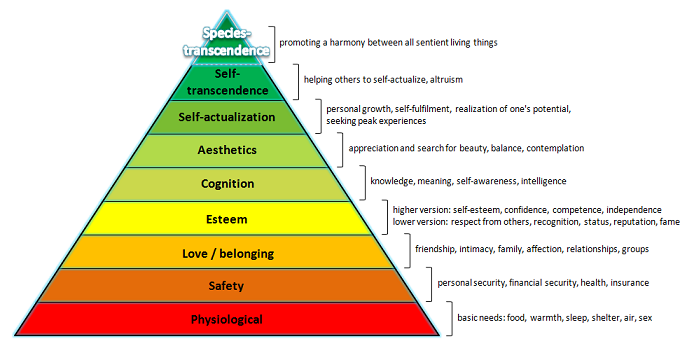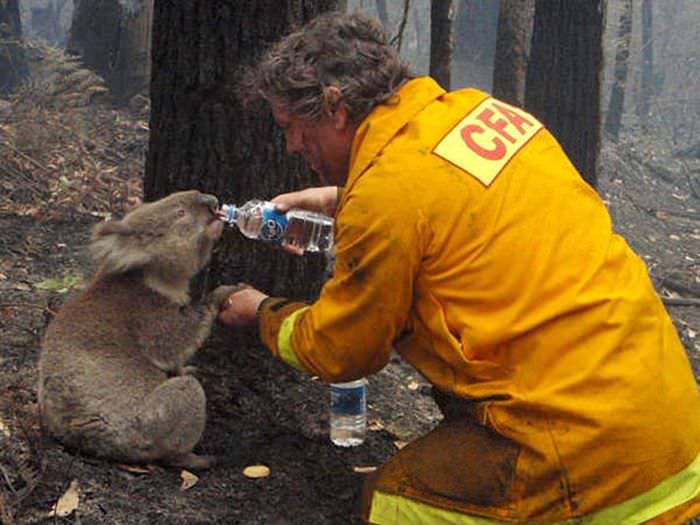

Abraham Maslow, an American academic working in the field of psychology, published a Hierarchy of Needs model in 1943, formulating a theory which still remains valid today for understanding and utilizing human motivation in various contexts such as team management or marketing. (see Wikipedia article)
Maslow's pyramid of hierarchical needs initially consisted in 5 levels:

Needs get satisfied in the given order, from the bottom of the pyramid upwards; once current needs are fulfilled, an individual's aims and drive may shift to the next higher order needs, according to a principle which Maslow called "metamotivation".
Levels 1 to 4 are deficiency motivators; level 5, a growth motivator (and relatively rarely found).
The thwarting of needs is usually a cause of detrimental stress. Examples:
You can't motivate someone to achieve their sales target (level 4) when they're having problems with their marriage (level 3).
You can't expect someone to work as a team member (level 3) when they're having their house repossessed (level 2).
More at http://www.businessballs.com/maslow.htm (e.g. read about "Maslow's self-actualizing characteristics")
Maslow later explored further dimensions of needs, while also criticizing his own initial vision on self-actualization. Indeed he came to the conclusion that the self only finds its actualization in giving itself to some higher goal outside oneself (altruism) — which corresponds to a higher level called self-transcendence.
(A.H. Maslow, "The farther reaches of human nature", in: Journal of Transpersonal Psychology 1(1969)1, pp. 1-9; A. Maslow, The farther reaches of human nature (New York: The Viking Press, 1971); Mark E. Koltko-Rivera, "Rediscovering the Later Version of Maslow's Hierarchy of Needs: Self-Transcendence and Opportunities for Theory, Research, and Unification", in: Review of General Psychology 10(2006)4, pp. 302-317)
Which led to revisions of his initial model by others, eventually resulting in the following 8-stage hierarchy:

So at the 8th level, self-transcendence consists in going beyond oneself and helping others to achieve self-actualization.
But what if those "others" happened to be animals?
Caring about other sentient species, rather than just about our fellow human beings, is objectively a higher, more abstract, level of transcendence — a sort of species-transcendance.
So either the 8th level (sometimes just called transcendence) should be comprised of two sublevels, according to whether the need is about (i) helping fellow humans or (ii) helping other sentient species, or else a 9th level should be introduced at the top, possibly called species-transcendence:

This top-level category of needs in essense drives the promotion of a harmony between species, whose elementary purpose is to safeguard their well-being — instead of the ambient condoning of their primitive exploitation for the sake of satisfying lower-level human needs.
Reaching for that level would elevate us, and them with us, in a virtuous circle.

picture source: http://www.awesomelycute.com/2014/03/people-doing-amazing-things-for-animals/
* * *
Additional comments:
It is our duty as the guardians of this planet to enable and safeguard that harmony.
By taking two kinds of actions:
And, perhaps in anticipation of critics deeming this as too far-fetched; species-transcendance is not really a matter of helping animals to 'self-actualize' here (although that could be an interesting endeavour in itself!); it's first and foremost to eradicate atrocious practices (extreme confinement, live skinning, mass painful killings, etc.).
There are direct, tangible benefits to humanity to achieve: avoiding animal epidemics which can spread to humans, avoiding the building of resistance to antibiotics (which are injected into animals then ingested by us as we eat them), reducing carbon emissions and multiple types of pollution, etc.
Fifty years hence, we shall escape the absurdity of growing a whole chicken in order to eat the breast or wing by growing these parts separately under a suitable medium.
Winston Churchill, 1931
We are late on the man's predictions.
Some food for thought. .
Razvan Saftescu, 24 Feb 2016 (last edited 1 Mar 2016)